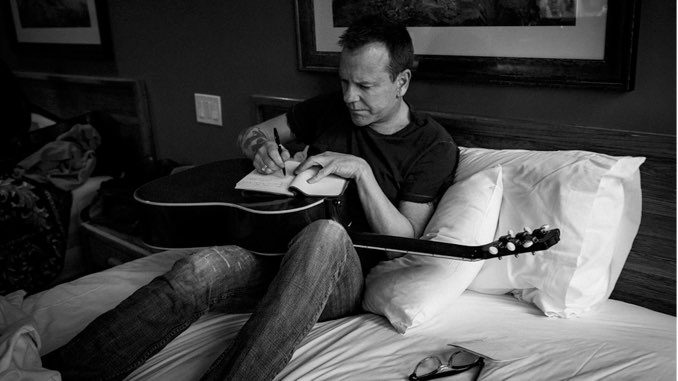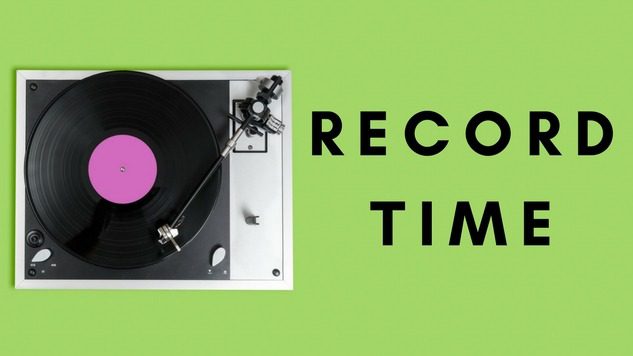More than once at a Drive-By Truckers show, I have seen the band pass around a bottle of whiskey between songs. Every time a band member took a gulp, cheers and hollers would go up from the crowd—well lubricated itself—as if the liquor was inextricably bound up in the glorious rock ‘n’ roll the band was making. This was a dangerous myth—especially dangerous because it was neither completely true, nor completely false.
On the Truckers’ masterful new album, Welcome 2 Club XIII, the band’s co-founders and chief songwriters, Patterson Hood and Mike Cooley, confront that myth head-on. On their past albums, the two had tackled many of the crucial elements of their Alabama upbringing—race, religion, guns, Molly Hatchet—and now at long last they were facing up to alcohol and the other ingredients of the partying lifestyle.
At the end of the 2018 sessions for their 2020 album, The Unraveling, the band recorded three of Hood’s newest songs: “Welcome 2 Club XIII,” “Billy Ringo in the Dark” and “Wilder Days,” all looking back to his 20s when he and Cooley were co-leading a band called Adam’s House Cat. Hood knew that those songs didn’t fit on the politically charged Unraveling, nor on its sequel, The New OK released later the same year. Earlier this year, the band decided to demo some of Hood’s and Cooley’s newest songs, and the results were so good, and so of a piece with those three 2018 leftovers, that the nine combined tracks became this year’s Welcome 2 Club XIII.
“I knew ‘Wilder Days’ would be the last song on this album,” Hood says over the phone from Colorado, where the Truckers will be playing the next day. “I can’t imagine a song that could come after that one. The way ‘Wilder Days’ made me feel was the way I wanted the whole record to feel. I wanted to write a whole record that would be worthy of that song.”
The song opens with a quiet, acoustic-guitar figure that lets us know immediately that the song is not coming from the midst of wildness, but from an older person looking back on youthful abandon, back when the singer was “young and full of big beliefs that life could not sustain.”
As with most such looks back at “the way it used to be,” there is a mixture of fondness for the thrilling escapades of yore and disbelief that one risked so much damage for so little reward. Is the sadness in Hood’s vocal a regret that those days are behind him, or a regret that he wasted so much time in a haze? Or both?
While certain chemicals can loosen one’s nerves and muscles for a night of performing, they can also blunt the intelligence needed for songwriting and recording—and undermine the health needed for long-term survival. The band’s younger selves had “death to cheat below our feet and yet we seldom died.” Hood and Cooley survived, but not everyone around them did.
“Even when we were caught up in it—and we’ve basically survived—I can see things in my past that could have ended badly,” Hood admits. “I never got strung out on hard drugs, but people died doing less than I did. We kept it between the lines most of the time, but we have friends that didn’t, and we have former band members who became former band members when they couldn’t reel it in—and I’m not talking just about Jason, who came out of it in a beautiful way.” He’s referring to Jason Isbell, who was asked to leave the band when his drinking got out of hand, who later sobered up and became the unofficial King of Americana.
In 2019, Cooley’s oldest son Ross turned 16, three years younger than Mike was when he met Hood at the University of North Alabama at Florence in 1985. The two college housemates soon abandoned school to pursue their rock ‘n’ roll ambitions in their group Adam’s House Cat, embracing the party lifestyle that seemed to go along with that dream. Now Mike had to watch his son sinking into the same lifestyle, and it wasn’t a pretty sight from his current perspective as a parent. But with his own, very public history, it was hard to preach.
“He was going through a phase of self-destructive behavior,” Cooley says, “and I asked myself, ‘How am I going to step up and be the leader who gets him through this?’ I felt the best way was to come clean about my own behavior and the example I might have set. I always thought being straight about it was the best approach, so I said, ‘You’ve gotten where you are partially from seeing my own destructive behavior.’ I wanted my son to make up his own mind about these things and not be influenced by peer pressure or my example. Eventually he groped past it like a champ. I even dialed back my own behavior.”
Cooley boiled down those talks with his son into a song that’s one of the new album’s highlights: “Every Single Storied Flameout.” Beginning with one of Cooley’s signature, Alabamified Keith Richards riffs, he fesses up to “All those well intentioned lies that I myself romanticized … It never stops amazing me how easily the heart believes what it wants to.” When swallowing too much of the wrong stuff, he’s implying, it’s easy to convince yourself it’s somehow heroic.
And you can’t be surprised if your fans and children believe it, too. “I’d have a lot of nerve to go feigning shock and outrage,” he sings; “If I’d been my example, I’d be worse.” As this uptempo rocker rumbles on, the torrent of confessions tumbles out of Cooley’s mouth, as old assumptions crumble into the guitar fuzz and blasting horns behind him.
“That might be my favorite Drive-By Truckers song,” Hood volunteers. “I love playing it. I love the way it rocks, how it’s happy-sounding even as it’s a brutal piece of self-examination. When you have a teenager living in your house doing some potentially dangerous things, what can you do when you’ve spent your life maybe glorifying those same things? I could never have written that song. It blows me away. The measure of songwriting is if it makes you feel something, and that song makes me feel a lot of things, which is even better.”
“In every beach town,” Cooley adds, “there’s always a hip store for the kids with T-shirts of Janis Joplin, Jimi Hendrix and Kurt Cobain—people who had so much to offer but couldn’t keep it between the ditches. But there’s no glory in flaming out. The idea I was trying to get across to my son was you don’t make any money off the songs that are written about you, only in the songs you write yourself.”
The tragedy of musicians who die too young from indulging too much is the subject of the darkest song on Welcome 2 Club XIII: “We Will Never Wake You Up in the Morning.” It begins with the almost reluctant strumming of Hood’s guitar over Brad Morgan’s funereal-procession drumming. In a world-weary voice over the throb of the drum and Mike Patton’s bass, Hood sings, “You drift into narcotic splendor of your never-ending bender … you down another glass, then drift off from our grasp / We will never wake you up in the morning.”
The song “Forged in Hell and Heaven Sent” describes a visit from an old friend, a fellow survivor of the rock ‘n’ roll life, that the narrator hasn’t seen in years. They used to “start drinking in the afternoon and close the bars all down,” Hood sings; they were “crazy death defiers chasing storms and racing trains.” That history has “taken its toll on you, and its lessons served us well,” but it also forged the friendship that makes this encounter so special. And now that they both have kids of their own, they now want to live as long as they can. Margo Price adds a harmony vocal, and her husband Jeremy Ivey a harmonica part.
“I’m a worrier,” Hood acknowledges, “so I worry about my kids all the time. I want them to have fun and to live life. This current time, after that fucking psycho in the White House, the lockdown and people under fire in schools, it’s made our kids afraid to live, and that worries me as much as the other extreme. The teenager in my house has no interest in drinking or partying in a way I would recognize. I’m glad they’re not doing lines off the football field, but I hope they’re not just looking at their phones and being afraid of everything.”
Like the conversation between those two old friends, this album spends a lot of time reexamining the past. The record’s title, Welcome 2 Club XIII, refers to a club where Adam’s House Cat used to play, but the bar is not wrapped in a romantic haze of fond memories. It’s described as what it was: a shabby joint with rude bartenders, a disco mirror ball, penny beer, cheap cocaine and a Foghat tribute band. The new album’s gatefold illustration by Wes Freed shows the band at the Club XIII: Cooley in a red dress, an improbably skinny Hood in a Pee Wee Herman T-shirt and one lone fan listening while everyone else in the bar ignores the band.
“Some people have described this album as nostalgic,” Hood says, “but I don’t see it that way at all. Club XIII was a shithole, and I never want to play there again. But I’m glad it was there for us to play when no one else would book us. What this record is about is the juxtaposition between how you were when you were young, how fun that was, and how you see it now. That’s the theme.”
“We were young and green and didn’t know anything in those days,” Cooley confirms. “It could be great fun; everybody has their memories of being that age, the age of sowing one’s wild oats. It’s kind of funny to think of the Club XIII now. We’d have 12-15 people who were into what we did, and everyone else in the club would ignore us or stay out in the parking lot. The décor was half-disco, half-honky-tonk; it was the place would go to hook up or to score some cocaine. It was a pretty seedy scene, to say the least.”
When Hood and Cooley were growing up in “The Shoals,” the northwest corner of Alabama, the towns of Florence, Muscle Shoals, Sheffield and Tuscumbia were dry, so those who wanted a drink had to rely on bootleggers or the bars and liquor stores set up on just the other side of the Tennessee line. No real town existed there, just these alcohol outlets. One of those bars was Club XIII.
“Living in a dry county was great,” Hood remembers, “because the bootleggers and the border stores didn’t care how old you were. When I was 16, I looked 13, but I could go to Tennessee and load kegs into my Toyota Celica and take them back and have a keg party and charge other teenagers to drink. I wrote a song about it called ‘Goode’s Field Road.’ That’s how I paid for my high school graduation trip to Florida.”
The State Line Gang ran the Tennessee border joints, and Buford Pusser, the police chief of Adamsville, Tennessee, tried to clean up the situation in a series of gun battles that became the source of the popular Walking Tall movies. Many locals, however, viewed Pusser as a bully who broke the law for his own purposes. That perspective was articulated in Hood’s song, “The Buford Stick.”
“We weren’t trying to glorify a legend,” Hood explains; “that was real shit to us. Cooley really did go to a Sunday School class taught by a guy from the State Line Gang. They’d make these guys go to churches and talk about what they’d done wrong, as part of his community service, but this guy didn’t seem too penitent. He made such an impression on a 16-year-old Mike Cooley, that Cooley wrote that song, ‘Cottonseed,’ about just what that guy said to those kids.”
That song, also on the 2004 album, The Dirty South, quotes the visiting lecturer as saying, “I had a .45 underneath my coat and another one in my boot … and I put more lawmen in the ground than Alabama put cottonseed.” During Hood’s and Cooley’s teenage years, however, Colbert County and the city of Florence both finally voted to go wet.
“After we got legal,” Cooley recalls, “the clubs from Tennessee came down to Florence and Muscle Shoals and opened there. But if you were going to play in those clubs, you pretty much had to be a cover band. That’s not what we were good at, and that’s not what we wanted to do. But once or twice a year they’d let us open for somebody.
“Mostly we practiced in Patterson’s grandmother’s basement, and people would come over to hear us there. A lot of bands did that, because there were no clubs for original music. You weren’t going to make any money at the clubs anyway, so you might as well play what you wanted, how you wanted, at home.”
Adam’s House Cat won Musician Magazine’s 1988 Best Unsigned Band contest, and they preserved that exalted status by never getting signed by anyone. But they deserved the recognition. When their one and only studio album, Town Burned Down, was finally released in 2018, it was surprisingly good, resembling the jangle-pop new wave of The Replacements and R.E.M. more than the rootsier sound of the Drive-By Truckers, the project Hood launched in Athens, Georgia, in 1996 with the intent of being in a band with Cooley again.
Now, 26 years later, the Truckers are still rolling down the highway this summer, coming to play at a town near you. They have seen lots of casualties along the way, but now they’re survivors, and being the latter is a lot better than being the former. “I find it best to laugh at the absurdity of life above the ground,” Hood sings on “Wilder Days.” “There’s no comfort in survival but it’s still the best option that I’ve found.”
“Alcohol is an undeniable part of this life,” allows Cooley. “You finally get to that point where the stories aren’t the war stories of fun and good times, they’re stories of death and self-destruction. We want our kids to emulate our best sides and not our worst sides, but it doesn’t always work out that way. But Ross is OK now; he’s out in Santa Fe building guitars.”
“There’s not a lot I would do too different,” Hood concludes. “It’s not like I’m sitting around wishing I didn’t do all that evil shit when I was young. I’m glad I didn’t do more, and I’m glad I didn’t do heroin, because I think I would have liked that shit. I did a lot of cocaine for a while, but when I was done with it, I was able to walk away from it, and I don’t miss it a bit. It wasn’t doing my singing voice any good and lord knows I didn’t have much voice to spare.
“I don’t have many regrets, but I’m glad I’ve lived to tell about it. Some people didn’t. As Cooley sang years ago, ‘Rock and roll means well, but it can’t help telling young boys lies.’”
Welcome 2 Club XIII
is out now on ATO Records.
Listen to a 2010 Drive-By Truckers session from the Paste archives below.



